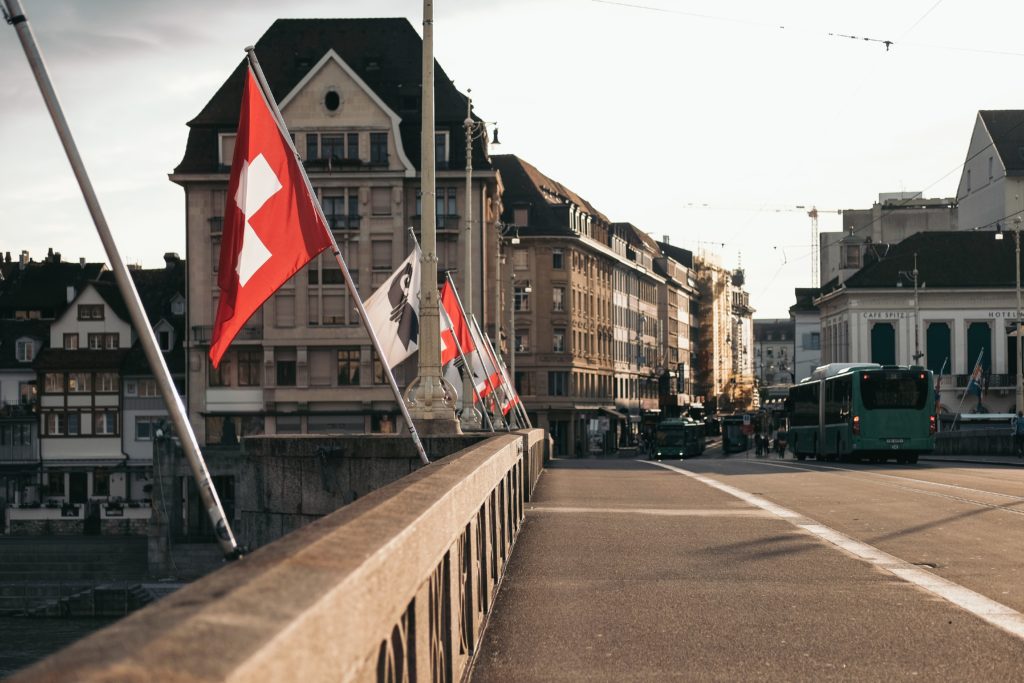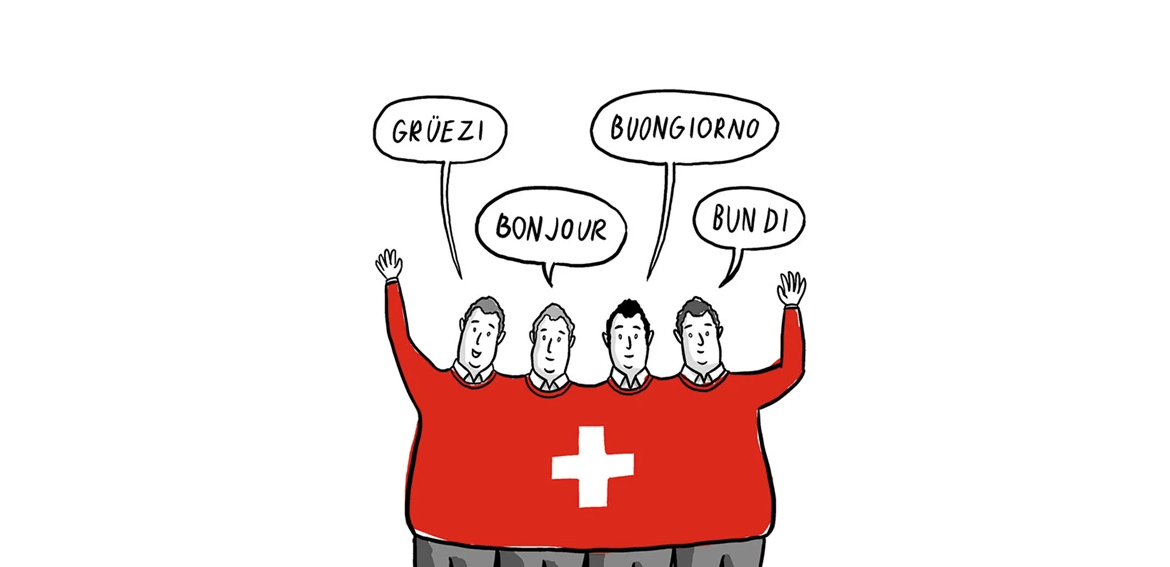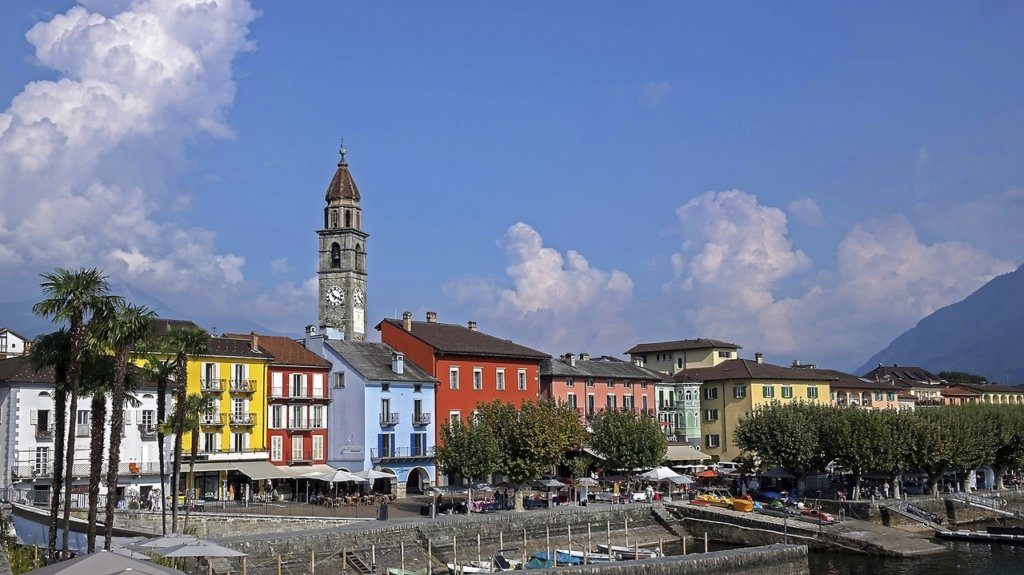Switzerland, renowned for its picturesque landscapes, chocolate, and watches, also offers an intriguing linguistic landscape that piques the interest of linguists, travelers, and residents alike. This blog delves into the intricacies of multilingualism in Switzerland, addressing the key question: “What languages are spoken in Switzerland?”
The landlocked European nation is a melting pot of languages, embracing diversity through its four official languages and a myriad of immigrant languages. Journey with us as we unravel the fascinating linguistic fabric of Switzerland, exploring each region, its dominant language, and the unique societal norms and traditions that have evolved around these languages.
The Four Official Languages in Switzerland

Even though the country is multilingual, the residents themselves do not speak all four languages. Switzerland consists of 26 cantons, and the language that is spoken in those cantons depends on their geographic position and the countries closest to them.
Further on, we will get a more in-depth look at Switzerland languages, based on information obtained from public-accessible data.
German
The German language is spoken in the eastern and central parts of Switzerland. The majority (about 60%) of the population speak Swiss-German, otherwise known as Schwiizertütsch which is a combination of various dialects that were once spoken in Austria and Germany. So, if you were to attempt to speak Schwiizertütsch to a German you will most likely be met with a confused or blank face. It is also difficult for a non-German to learn to speak it.
A large variety of these dialects is constantly spoken among Swiss Germans, which differ depending on the community that uses them. While in many countries dialects are usually looked upon, in Switzerland, they are especially favored and nurtured.
From an early age, the Swiss are taught Standard German (or High-German) in schools, since there is no official written language. This enables them to communicate with Germans and Austrians without any problem. Additionally, Standard German is used for news broadcasts, information signs, public announcements, and other formal occasions.
French
French is spoken in the western part of Switzerland, by about 20% of the population. Standard French does not differ much from Swiss-French, spoken written and spoken pretty much the same as in France. Still, the differences you encounter are much more pleasant for those who are just learning the language, especially the numbers! The Swiss dialect has a slower pace and a lovely old-fashioned quality.
French is spoken exclusively in the Romandy region of Switzerland, which covers the cantons of Geneva, Jura, Vaud, Neuchâtel, and in parts of Bern, Valais, and Fribourg.
Italian
The Swiss-Italian dialect differs from the one spoken in Italy, but standard Italian is still the written language. The cantons that speak Swiss-Italian include Ticino, the southern regions of Graubünden, and Gondo valley in Valais.
Romansh
Romansh, or Rumantsch, has been spoken for centuries in some valleys of Graubünden but it was not recognized as a national language until 1938 and has become an official language only in 1996. It has five dialects despite the small size (less than 1%) of the community that speaks it. It is regularly referred to as a romance language that has borrowed a large portion of its syntax from German. Most of the Romansh-speaking community start learning German in kindergarten and therefore it is easy for them to speak without an Italian or French accent.
The Influence of Immigrants’ Languages

Since immigrants have brought their own language with them in Switzerland, as a whole they have now outnumbered both Rumantsch and Italian. Around 5.1% of the population lists English as one of their main languages, followed by Portuguese at 3.7% and Albanian at 3.1%, according to the Federal Statistical Office (link is in French).
Immigrants speak their mother tongue in their private homes, so they rely on the official Swiss language of the region they reside in to read product declarations in the supermarket, to stay informed about important events in Switzerland, and to communicate.
Language Barriers
The cantons in Switzerland are very autonomous and have their own authorities. Therefore, education, tax systems, and much more are different in every canton, which can get fairly complicated. The average Swiss has a strong feeling of belonging towards his or her home canton, especially in the German-speaking part; rather than calling themselves just Swiss, they are Zürcher, Basler, or Berner (a person from Zurich, Basel, or Bern).
Therefore, Kantönligeist is sometimes also used to describe the attitude of residents from one canton towards people from another. If you were to ask the swiss how they keep the cantons unified, the common answer would be that they stick together since they dislike others more… and their love for cheese! But on a serious note, the respective Swiss-speaking residents have solidarity with other neighbors that speak the same language, since they are their doctors, clerks, maintenance people, etc.
As stated by BBC, they’re all held together in what the Swiss call ‘Willensnation’. It literally means a ‘nation by will’, but in Switzerland the word takes on a special significance, conveying ‘a nation born with the desire to live together’. In the end, everyone values their independence and uniqueness to divide the nation without being affected by the overlapping of the languages.
Swiss Languages Facts
Kantönligeist
The Swiss have a word called Kantönligeist (meaning cantonal patriotism). It refers to the unique identity, culture, and history that every canton has. It was connoted in a slightly negative way for the strong federalism in Switzerland.
Röschtigraben
A term you will definitely come across while living in Switzerland is Röschtigraben or Rideau de Rösti (literally meaning the Rösti line), which is a potato dish, especially popular in the German-speaking part of the country. The name refers to the invisible line that splits the French and German-speaking parts of Switzerland and the undeniable dissimilarities, especially when it comes to votes. Geographically, the Röschtigraben follows the Saane River running through the bilingual canton of Fribourg.
Monolingual and bilingual cantons
22 cantons have only one official language despite there being four official languages.
Some of the cantons that are bilingual are Fribourg/Freiburg, Berne/Bern, and Valais/Wallis.
English as the language of business
English is used as the common language of business in Switzerland. The canton of Zurich discussed implementing English as the first language since it is used as the common language of business in Switzerland.
The primary language in schools
When it comes to the school curriculum each canton decides when and what supplementary languages are added. The French and Italian speaking population add German as the primary language to learn. Swiss-Germans add French.
The Francophone Festival
There is an annual event around March 20th called The Francophone Festival that celebrates the French language and its population in Switzerland.
Trilingual Graubünden
Even though Romansh is mostly spoken by the Rumantsch themselves, the Graubünden canton is the only canton that is trilingual.
There you had it, the very interesting languages of Switzerland and everything in between.
Frequently Asked Questions (FAQs)
Is English widely spoken in Switzerland?
Yes, English is widely spoken in Switzerland, especially among the younger generation and in the business environment. Around 5.1% of the Swiss population lists English as one of their main languages, according to the Federal Statistical Office.
Are there cantons in Switzerland that are bilingual?
Yes, there are bilingual cantons in Switzerland. Examples include Fribourg/Freiburg, Berne/Bern, and Valais/Wallis.
What is the Francophone Festival?
The Francophone Festival is an annual event that takes place around March 20th. It celebrates the French language and its speakers in Switzerland.
Is there any part of Switzerland that is trilingual?
Yes, the canton of Graubünden is trilingual. It is where German, Italian, and Romansh are spoken. Romansh is predominantly spoken by the Romansh community.
What is the main difference between Swiss-German and Standard German?
Swiss-German, or Schwiizertütsch, is a collective term for the various dialects spoken in Switzerland and differs significantly from Standard German. It can be difficult for Standard German speakers to understand. In school, Swiss Germans are taught Standard German, which is also used for formal occasions and written communication.
Do Swiss citizens typically speak more than one of the official languages?
While it’s common for Swiss citizens to learn more than one language, it’s not typical for them to speak all four official languages fluently. The languages spoken largely depend on the geographic location of the canton and its closest countries.
Where in Switzerland is French predominantly spoken?
French is mainly spoken in the Romandy region, covering cantons such as Geneva, Jura, Vaud, Neuchâtel, and parts of Bern, Valais, and Fribourg.
Why is the Swiss-German dialect challenging for non-natives to learn?
Swiss-German, otherwise known as Schwiizertütsch, is a combination of various dialects once spoken in Austria and Germany. Its variety and its significant differences from Standard German make it difficult for non-natives to learn.
How do Swiss residents of different language regions communicate with each other?
The residents usually communicate in the official language of the region they reside in, and English is also often used as a common language. Additionally, Swiss residents are usually taught multiple languages from a young age, making inter-regional communication easier.
How does the Swiss education system accommodate the linguistic diversity?
Each canton decides when and what supplementary languages are added to the school curriculum. For example, the French and Italian-speaking population add German as the primary language to learn, while Swiss Germans add French.
How does the linguistic diversity of Switzerland influence its cultural and social life?
The linguistic diversity in Switzerland strongly influences its cultural and social life. Each language region has its unique identity, culture, and history. This diversity fosters a sense of local identity and belonging among the residents of different cantons.
Sources:
eda.admin.ch/aboutswitzerland/en/home/gesellschaft/sprachen.html
bfs.admin.ch/bfs/de/home/statistiken/kataloge-datenbanken/tabellen.assetdetail.7466542.html
admin.ch/opc/en/classified-compilation/19995395/index.html#a4
fr.ch/institutions-et-droits-politiques/statistiques/fribourg-le-canton-a-la-couture-des-langues
sta.be.ch/sta/fr/index/ein_kanton-zwei_sprachen/ein_kanton-zwei_sprachen/amtssprachen.html
swissinfo.ch/eng/official-romansh-still-has-some-way-to-go/5440928#:~:text=Romansh%2C%20a%20Latin%2Dbased%20language,of%20Switzerland’s%20four%20national%20languages.&text=In%201938%20it%20scored%20a,until%201996%20for%20official%20status.
swissinfo.ch/eng/focus_how-do-the-multilingual-swiss-talk-to-each-other-/45437662
bbc.com/travel/story/20180325-switzerlands-invisible-linguistic-borders
internations.org/go/moving-to-switzerland/living/difficulties-differences-through-switzerlands-language-diversity
bfs.admin.ch/bfs/fr/home/statistiques/population/langues-religions/langues.html
babelgroup.co.uk/resources/cultural-newsletter/cultural-newsletter-switzerland/



